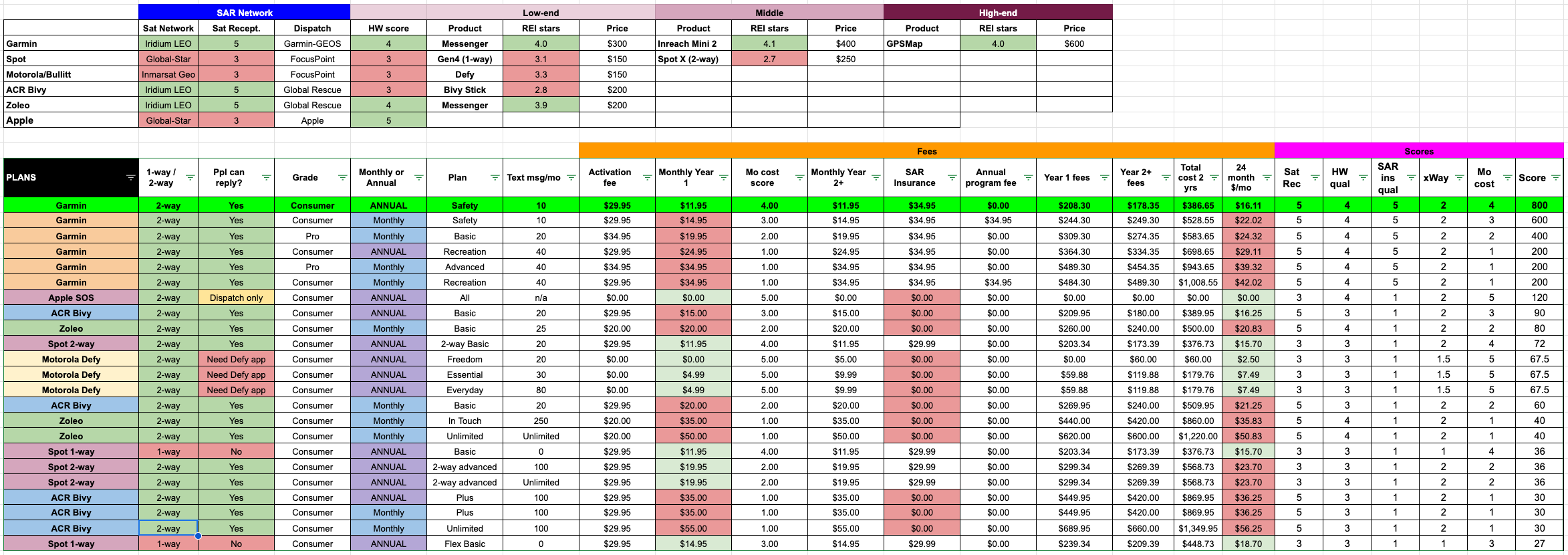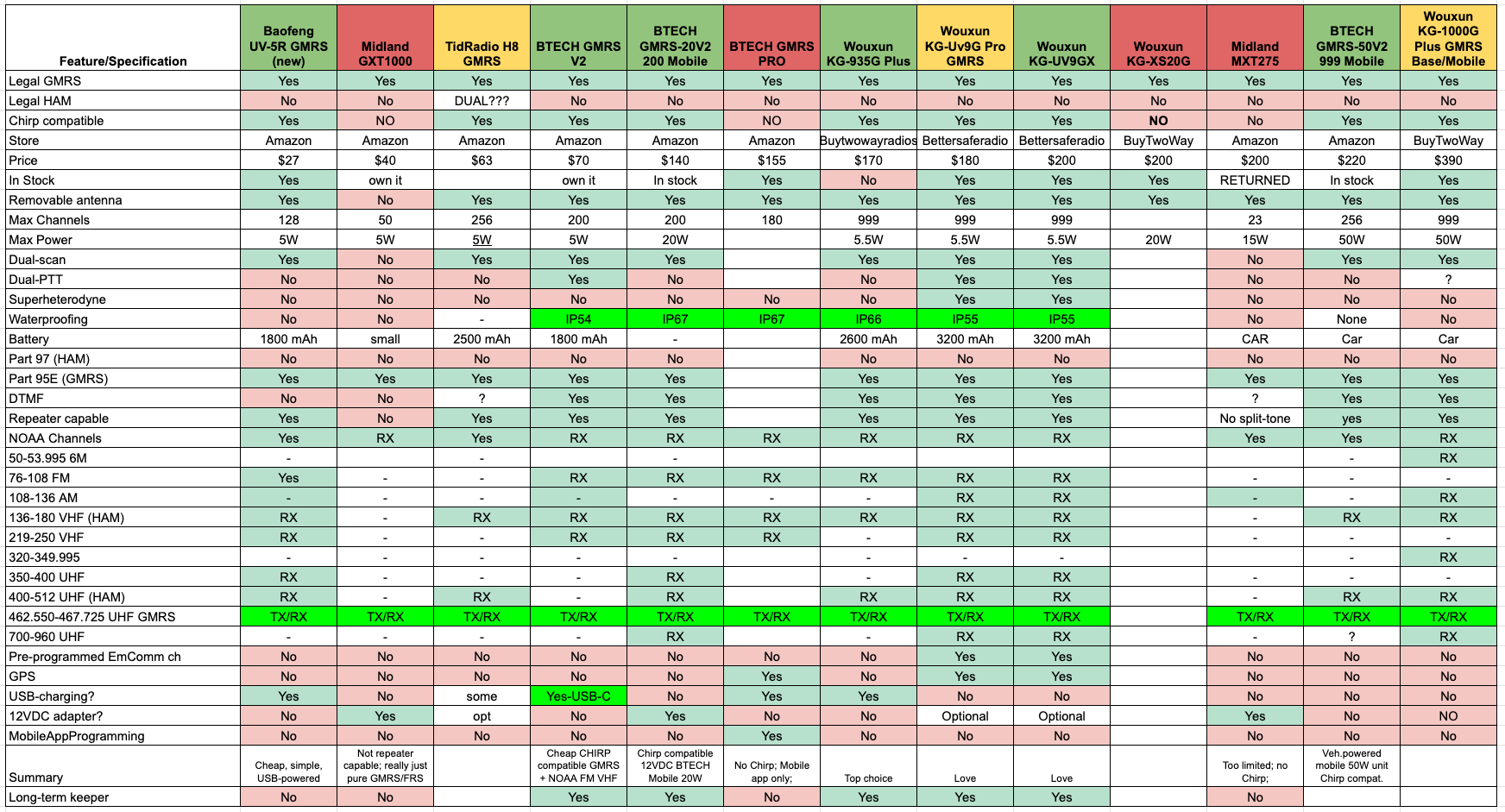Communications for Overlanding (GMRS & Satellite 2-way messengers)
It's critically important to have a means to communicate when off-grid. I did a deep-dive on both satellite 2 way messengers and also 2-way GMRS radios and thought I'd share the results here in case anybody else is going down the same rabbit hole
It's critically important to have a means to communicate when off-grid. I did a deep-dive on both satellite 2 way messengers and also 2-way GMRS radios and thought I'd share the results here in case anybody else is going down the same rabbit hole.
When you're going off-grid, having a cell phone or cell-phone booster is not enough. You need a consistent way to communicate to friends, family, and potentially search and rescue if you need it. For that reason I think the first priority is to have a 2-way satellite messaging device/plan. There are 1-way devices but I don't think they're worth bothering with when we have 2-way devices. The second priority is to have local communications for your party and for others around you on the trail (i.e. 2-way radios). Given the decline of CB radio, the high threshold of needing to write a test to use ham radios, GMRS has filled a perfect spot in the middle for a lot of overlanders and 4WD clubs.
Satellite 2-way messenger communications
Backdrop
It's important to note that there are device vendors, those devices leverage a particular satellite network, and also direct your SOS to a particular call center. On top of that, if you hit the SOS button and they direct your search and rescue effort, you may end up on the hook for $100,000 of recovery costs so you better also have insurance if you have to get helicoptered off a mountain peak in a snowstorm.
My requirements
I want to be able to communicate to anybody on any channel (email, SMS) from my phone or my sat messenger device without the recipient needing to download an app. It should be simple to buy, and simple to use.
What I evaluated
I looked at Garmin, Zoleo, Apple, Spot, Motorola (Bullitt), ACR. Data is in the table below. While Garmin's plan pricing and software are nightmare to navigate, they're still the best of the best in this realm. Zoleo gets great reviews for an easy to buy and easy to use app and hardware but their monthly cost is $20/mo which most people just won't want to pay for. Spot has less-loved hardware but their 2-way messaging device can be put on an equivalent $12/mo plan (albeit on a less great network than the Garmin.) ACR's hardware and software get crappy reviews and Bullitt's new Defy product (they licensed the Motorola name for it) has horrible reviews, seems half-baked, and is on a bad network (InMarSat). For a critical piece of tech I wouldn't trust a new entrant trying to out-cheap everybody else.

My choice - Garmin InReach Mini + Consumer Safety plan
At the end of the day, I personally chose to move my existing Garmin InReach Mini onto the Annual Consumer safety plan because for only $65 (startup + 1st year insurance), I can put it on a $12/mo plan so it's always available - I never have to wonder if it's ready before a trip and it's also always available in case of any local disaster situations.
My recommendation to others
If you're buying new, check out the Garmin Messenger for $300 or the Mini 2 for $400. (They have others too like the GPSMap and Montana if you really want big devices.)
Why Garmin?
Their products are in use world-wide, they have multiple devices to fit your budget ($250-$750), their systems have high uptime they use a great satellite network (Iridium) with strong reception, and they have easy-to-add search and rescue insurance ($35/person/yr). The downside is that navigating their NINE plans is like an IQ test and their software is usually a mess to navigate (Earthmate, Explore, Messenger app). However most people can just use one of their annual consumer plans and pay $12/mo or $15/mo for the base plan and be pretty well covered. If you need bigger hardware or bigger plans, they have both.
What about Apple's SOS?
Apple's new satellite SOS option is great for people with no other devices and will save a lot of lives. However it uses a worse network (Global-star, same as Spot uses), and only lets you communicate to their dispatch center. It's an SOS option for if you have no other options. It does not do 2-way messaging to anybody other than the dispatch call center. Think of it as your backup to your primary 2-way messaging & SOS platform, not a replacement for it.
Two Way Radios (GMRS)
My requirements
I wanted radios that can transmit on GMRS, that can receive/scan many non-GMRS bands, that were good-quality, had US support, were CHIRP programmable on the Mac, and could be powered via USB of some kind in the truck.
What I shortlisted
Handsets
I started on the Midland GXT1000 4-pack set. Great radios, super easy to use, very clear sound. However, they do NOT support repeaters at all and they also weirdly added 38 fake channels that are really just channels 1-22 with "privacy codes" on them. These are excellent family radios and will interoperate well with any of the radios below. Recommend for beginners or people who will never ever use repeaters (which honestly is probably most people.)
[SIDE NOTE: privacy codes are not private - they filter out everybody NOT using that code so that you can not hear them but they can hear you. Don't ever let any marketing material or sales person tell you that GMRS are secure - they're not.]
I tested the updated Baofeng UV-5R GMRS compatible radios and immediately ran into programming issues and flakiness and sent them back the next day.
I ordered a set of the Wouxun KG-935G Plus however they were back-ordered for so long I had to cancel. They are a solid 999 channel handset, that's CHIRP compatible, has 5.5W of power, some decent water proofing, lots of band range for scanning, and can be charged with USB-C. Great radios if you can find them but more expensive than the BTECH GMRS V2.
I ended up buying a third set of the BTECH GMRS V2 handsets. Why three sets? Because I bought sets for friends to use. They're simple to use, have a US-based support team, are CHIRP compatible, and have USB-C charging. Excellent handsets and I'd recommend them for only $70 each. They are a low-cost, high value, good quality option for most people.
Vehicle-based options
I tested the Midland MXT275 20W radio. Easy setup, super clear audio, but doesn't support repeaters with split codes (which is half of them) so not sure I see the point of this radio unless you're all going simplex (point to point). There are better choices.
I ended up selecting the BTECH GMRS-20V2 because it was small, waterproof, powerful, CHIRP programmable, and can run off a 12VDC cigarette adapter. Since I had the GMRS V2 radios, I liked that the programming and usage patterns were similar.
I considered the BTECH and WOUXUN 50W radios but neither will run off the 12VDC cigarette adapter so they're a bigger commitment to install full-time in the vehicle, making them less portable.

Summary
I hope this is helpful to others who are exploring their options in these two very messy and very confusing markets.